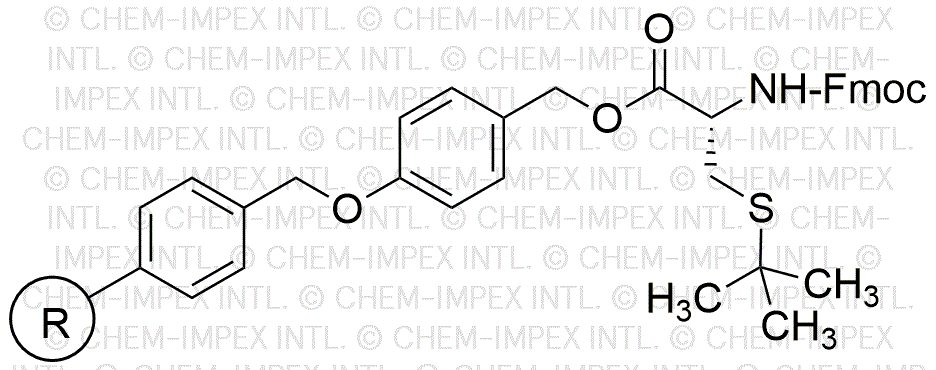Fmoc-S-tert-butyl-D-cysteine 4-alkoxybenzyl alcohol resin is widely utilized in research focused on:
- Peptide Synthesis: This resin is essential in solid-phase peptide synthesis, allowing for the efficient assembly of peptides with specific sequences, which is crucial in drug development and therapeutic research.
- Bioconjugation: It serves as a versatile linker for attaching biomolecules, enabling researchers to create targeted drug delivery systems that improve the efficacy of treatments in cancer therapy.
- Protein Engineering: The resin facilitates the modification of proteins, which is vital for studying protein interactions and functions, enhancing the understanding of biological processes.
- Analytical Chemistry: It is used in the development of analytical methods for detecting and quantifying peptides and proteins, aiding in quality control and assurance in pharmaceutical manufacturing.
- Material Science: The resin can be incorporated into novel materials for biomedical applications, such as tissue engineering, due to its biocompatibility and functional properties.
Informations générales
Propriétés
Sécurité et réglementation
Applications
Fmoc-S-tert-butyl-D-cysteine 4-alkoxybenzyl alcohol resin is widely utilized in research focused on:
- Peptide Synthesis: This resin is essential in solid-phase peptide synthesis, allowing for the efficient assembly of peptides with specific sequences, which is crucial in drug development and therapeutic research.
- Bioconjugation: It serves as a versatile linker for attaching biomolecules, enabling researchers to create targeted drug delivery systems that improve the efficacy of treatments in cancer therapy.
- Protein Engineering: The resin facilitates the modification of proteins, which is vital for studying protein interactions and functions, enhancing the understanding of biological processes.
- Analytical Chemistry: It is used in the development of analytical methods for detecting and quantifying peptides and proteins, aiding in quality control and assurance in pharmaceutical manufacturing.
- Material Science: The resin can be incorporated into novel materials for biomedical applications, such as tissue engineering, due to its biocompatibility and functional properties.
Documents
Fiches de données de sécurité (FDS)
La FDS fournit des informations de sécurité complètes sur la manipulation, le stockage et l’élimination du produit.
Spécifications du produit (PS)
Le PS fournit une description complète des propriétés du produit, notamment sa composition chimique, son état physique, sa pureté et les exigences de stockage. Il détaille également les plages de qualité acceptables et les applications prévues du produit.
Certificats d'analyse (COA)
Recherchez des certificats d'analyse (COA) en saisissant le numéro de lot du produit. Les numéros de lot et de lot se trouvent sur l'étiquette d'un produit, après les mots « Lot » ou « Lot de fabrication ».
Numéro de catalogue
Numéro de lot/série
Certificats d'origine (COO)
Ce certificat d'exploitation confirme le pays dans lequel le produit a été fabriqué, et détaille également les matériaux et composants utilisés et s'il est issu de sources naturelles, synthétiques ou autres sources spécifiques. Ce certificat peut être requis pour les douanes, le commerce et la conformité réglementaire.
Numéro de catalogue
Numéro de lot/série
Fiches de données de sécurité (FDS)
La FDS fournit des informations de sécurité complètes sur la manipulation, le stockage et l’élimination du produit.
DownloadSpécifications du produit (PS)
Le PS fournit une description complète des propriétés du produit, notamment sa composition chimique, son état physique, sa pureté et les exigences de stockage. Il détaille également les plages de qualité acceptables et les applications prévues du produit.
DownloadCertificats d'analyse (COA)
Recherchez des certificats d'analyse (COA) en saisissant le numéro de lot du produit. Les numéros de lot et de lot se trouvent sur l'étiquette d'un produit, après les mots « Lot » ou « Lot de fabrication ».
Numéro de catalogue
Numéro de lot/série
Certificats d'origine (COO)
Ce certificat d'exploitation confirme le pays dans lequel le produit a été fabriqué, et détaille également les matériaux et composants utilisés et s'il est issu de sources naturelles, synthétiques ou autres sources spécifiques. Ce certificat peut être requis pour les douanes, le commerce et la conformité réglementaire.

